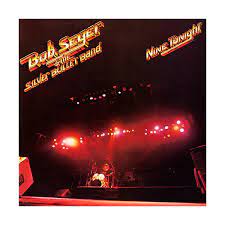His best? His worst? You’ll find people who’ll argue either, but probably Bob Seger‘s Against the Wind was neither. It arrived this day in 1980. It was his 11th studio album overall, and third credited to Seger and the Silver Bullet Band, his regular backing unit for years.
The ’80s arrived finding Seger in his mid-30s and an established superstar. And, after years of hard work and constant touring, perhaps a bit of a weary one, as suggested by his earlier hit “Turn the Page.” Seger said this album was about “trying to move ahead, keeping your sanity and integrity at the same time.” The result was a 10 song effort that mixed tuneful ballads and his more typical up-tempo rockers. He’d recorded it in two parts the year before, half in Miami and half in Muscle Shoals with their great session players including Roger Hawkins on drums, David Hood on bass and Pete Carr adding guitar to Seger’s own (not to mention his Silver Bullet Band guitarist Drew Abbott). And for good measure he used Dr. John on keyboards on “Horizontal Bop” and his old friend Glenn Frey, as well as other Eagles Don Henley and Timothy B. Schmit for backing vocals on the lead single, “Fire Lake.” Another Eagles name on Against the Wind was Bill Szymczyk, their usual producer from 1974 on, who co-produced the record with Seger and the Muscle Shoals crew.
The album didn’t sound terribly different than his previous pair, Night Moves and Stranger in Town, albeit perhaps a little more smoothly produced. Billboard saw it as a hit in the works, and both the New York and L.A. Times approved. The West Coast one suggested it was “close to his earlier work” but by now he was “mastering the form” and that the ballads, like “Fire Lake” and the title track stood out. Rolling Stone on the other hand panned it in a big way. They did think it “carefully constructed” but overall found it full of songs that were “utterly listenable and quite meaningless” which resulted in “not only the worst record Bob Seger has ever made but an absolutely cowardly one as well.” The Grammys obviously disagreed; he won his only such award for it in the Best Performance, Rock category. The art director also won one for its running horses cover, for Best Packaging. Years later on, allmusic graded it 4-stars,
a good record where he was “performing better on the ballads than the rockers” (they lamented him opening it with “Horizontal Bop”, a “careless…tossed-off “ song that was his worst in over a decade) and while not his best record, “compared with its peers, a strong, varied heartland record.”
Compared to its peers, and other records of that year, it performed strongly too. It hit #1 in the States for six weeks, his only chart-topper, and for three weeks in Canada, going 5X platinum in both countries (which actually has it a tad below his previous two in sales in the U.S.). Overseas, reaction was middling with it missing the top 10 in places like the UK and Australia. While album cut “Betty Lou’s Getting Out Tonight” and the final single, “Her Strut” both did OK on rock radio, it missed the top 40 but “Fire Lake” and “Against the Wind” were both top 10s in North America and “You’ll Accomp’ny Me” made it to #14.
Seger never had quite that level of success again, though he continued to sell well in the ’80s and be a major live draw until he retired in 2018.











